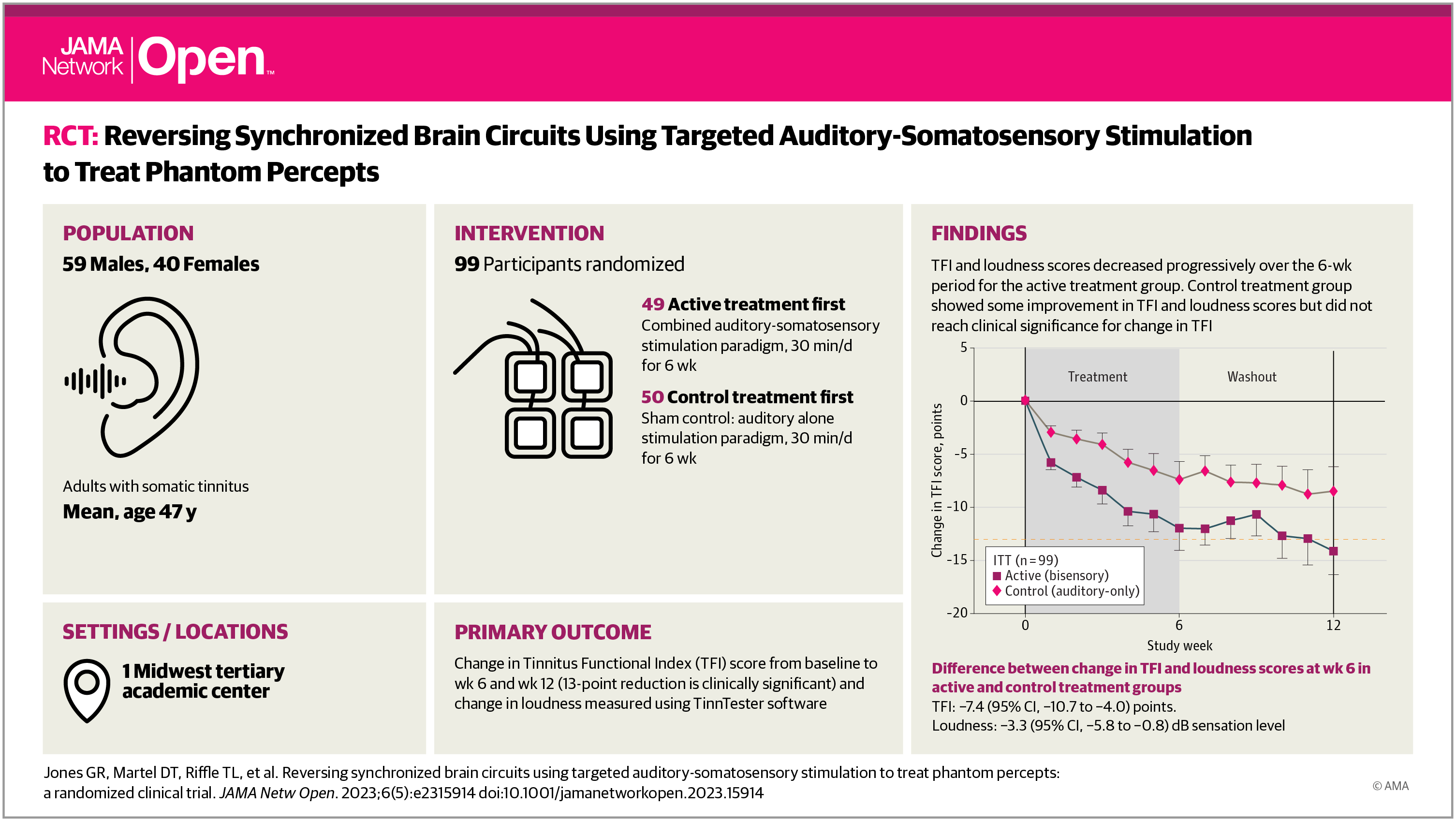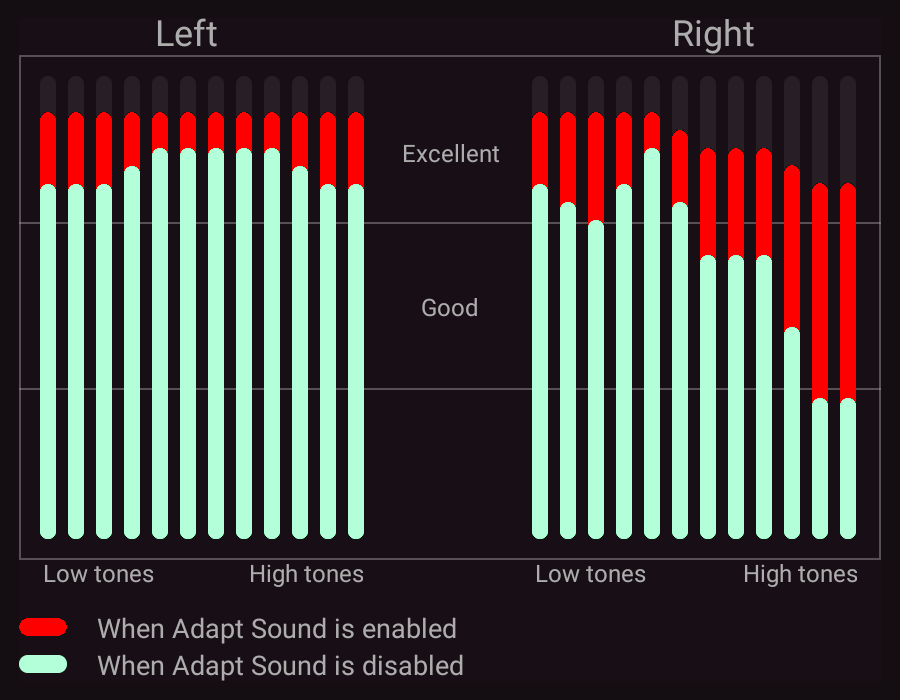I can hear the sound of money
I hate writing so negatively about so many things, but it just so happens that people are stupid, evil, or both. In this particular case it’s about health, patents, slowness and, most likely, generalized stupidity.
Case in point
The other day, an article on The Brighter Side of News, dated Nov. 7, 2023, jumped into my Flipboard feed: Breakthrough tinnitus treatment dramatically improves life for 40 million US adults.
Improves, as in present tense? They must be kidding.
There’s a desperate search for relief, and now, thanks to pioneering research from the University of Michigan’s Kresge Hearing Research Institute, hope appears on the horizon.
The latest study spearheaded by Susan Shore, Ph.D., Professor Emerita at Michigan Medicine’s Department of Otolaryngology and U-M’s Departments of Physiology and Biomedical Engineering, dives deep into the intricacies of how our brain processes bi-sensory information.
Published in the reputed JAMA Network Open, the study [etc. etc.]
The results were unequivocal.
On receiving bi-sensory treatment, participants unanimously reported significant enhancements in their quality of life. The handicap scores plummeted, and the perceived loudness of tinnitus decreased markedly. Such effects were conspicuously absent in the sound-only stimulation phase. […]
“The horizon looks promising. Our findings open the doors for employing personalized, bi-sensory stimulation as an efficacious tinnitus remedy,” Shore concluded with a note of optimism.
And the future looks even brighter. Auricle Inc., granted exclusive licensing rights for the bi-sensory stimulation patents, has already sprung into action. Established with the backing of Innovation Partnerships, the epicenter of research commercialization endeavors at the University of Michigan, Auricle is blazing the trail. Their mission? Acquiring regulatory approvals and bringing to the world Shore’s innovative bi-sensory tinnitus treatment.
For tinnitus sufferers, the days of silent agony might soon be a thing of the past.
No fucking kidding?
Here’s the study, published June 2, 2023: Reversing Synchronized Brain Circuits Using Targeted Auditory-Somatosensory Stimulation to Treat Phantom Percepts. And a graphical abstract:

Now, let’s get serious.
How are things with tinnitus
I don’t have tinnitus, or at least I don’t think I have it. Maybe I have a queer form of it, occasionally, when I have the strange feeling of a deafening or stunning silence, and not figuratively: I don’t hear anything, but in the surrounding silence it’s as if I struggled to hear ultrasounds, and failed. They say ultrasound tinnitus isn’t a thing, and nobody’s using “mosquito ringtones” around, so maybe this is just my imagination, but I’m sensitive to whatever has the potential of impairing the hearing.
That’s because, based on some tests, my right ear already has difficulties in perceiving the high frequencies. In light green, the frequency response of the uncorrected signal; in red, after applying an EQ correction:

People with confirmed tinnitus–and there are a surprisingly large number of famous musicians and celebrities among them!–have so far few means to alleviate their condition. Auditory treatments include the use of some app (not free, and sometimes subscription-only!) based on the following principle: first, one’s “tinnitus frequency” is identified, then the app plays a “pink noise” with the respective tinnitus frequency filtered out. Listening to this every day should slightly improve one’s tinnitus symptoms by forcing the brain to adjust for the missing frequency. Such apps include e.g. Tinnitus alleviator app, by Enpower Apps, Tonal Tinnitus Therapy, by appyhapps.nl, Tinnitus Therapy Pro by Liam O’Donnell. The problem is that some people have tinnitus on multiple frequencies! Then, most apps that claim to help with your tinnitus are a sham: they don’t adjust to your frequencies, but offer several noises that are normally used to calm you and help you fall asleep. But even when they do what they’re supposed to do, the tinnitus doesn’t diminish in some people. (I suppose there are hardware devices able to do the same thing for people who don’t wish to use a smartphone or a tablet.)
Now, a mixed treatment, adding a sensory (through electrodes) stimulus to the auditory one, especially as it’s proven to be more effective, should be a reason to rejoice, right?
Not so fast!
At the end of the study, you’ll find this:
Conflict of Interest Disclosures:
Dr Martel reported receiving cofounder equity from Auricle Inc and coinventor royalties from the University of Michigan during the conduct of the study; being cofounder of Auricle Inc outside the submitted work; and being a coinventor on US Patent 9,682,232, Personalized Auditory-Somatosensory Stimulation to Treat Tinnitus, outside the submitted work. […]
Dr Shore reported receiving cofounder equity from Auricle Inc and coinventor royalties from the University of Michigan during the conduct of the study; being cofounder of Auricle Inc outside the submitted work; and being a coinventor on US Patent 9,682,232, Personalized Auditory-Somatosensory Stimulation to Treat Tinnitus, outside the submitted work.
OK, there is a commercial interest in that. Not everyone is Dr. Salk. No problemo. But US Patent 9,682,232, Personalized auditory-somatosensory stimulation to treat tinnitus, has been filed on 2015-12-21, and granted on 2017-06-20.
So the study published in June 2023 came SIX YEARS after the patent was granted, and 7½ years after it has been filed! They had the technology for so many years, yet they still can’t offer anything to the people who could benefit from it!
OK, all right, the sensory stimulation device would need to get some certifications. But not necessarily as a medical device, as it’s not meant to be used in a medical environment (it could be used at home), and it’s just a helper, not a real cure. There are so many snake-oil devices that are on the market, and there are no definitive studies for them: for acupuncture, acupressure, electroacupuncture, if not for so many other questionable fantasy theories (electrical stimulation for losing weight, for alleviating the pain, for building muscles, etc.) about which a single thing is certain enough: that they don’t kill you (or not right away).
Dr Shore is coauthor of another study, published in August 2021: Bimodal auditory-electrical stimulation for the treatment of tinnitus: pre-clinical and clinical studies.
Still not enough to get a device on the market. Fuck it, why can’t a Chinese use the insights from the patent description to design a device (even based on Arduino!) that anyone could adjust themselves until the results are observed? Screw Auricle Inc’s “mission” (I quoted from the study!) to… make money!
Actually, since I mentioned Dr. Salk: why is everyone so money-oriented when it comes about health? Why isn’t there anything like Open Invention Network or Open Patent Alliance, but for patents related to medical devices? The only cases of open-source medical devices that I know of were some open-source ventilators (triggered by the COVID-19 pandemic) and some prosthetic limbs. That’s far from being enough.
If such a simple device (yes, it’s simple!) requires TEN YEARS or more to reach the public, even when there are strong financial incentives and prospects of serious profits, what could be said of the so many cancer treatments that need up to 20–25 years to reach the patients? Just how many lives were lost because of such a slow bureaucracy? (The counterexample of the rushed clinical tests for mRNA-based SARS-CoV-2 vaccines shows that a certain time is nonetheless needed for proper assessment.)
This modern civilization is going to succumb to its own idiocy.

Leave a Reply